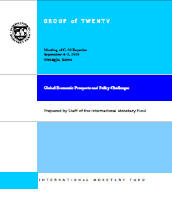Group of Twenty -- Meeting of G-20 Deputies
IMF Note on Global Economic Prospects and Policy Challenges
September 4-5, 2010, Gwangju, Korea
About the Executive Summary
The Following executive summary is from a note by the Staff of the IMF prepared for the September 4-5, 2010 meeting of the Group of Twenty Deputies in Gwangju, Korea
Read the Full text ![]()
Executive Summary
Economic recovery has advanced despite setbacks to financial recovery. Global growth has been somewhat stronger than expected during the first half of 2010, but is projected to slow temporarily during the second half of 2010 and the first half of 2011. In advanced economies, recovery remains fragile since employment and household consumption remain sluggish, although investment is beginning to show some strength. In emerging economies, activity is fairly broad based, but growth is expected to moderate while remaining robust.
Turbulence in financial markets has receded in recent weeks, but confidence remains fragile. Unprecedented European policy initiatives have eased concerns about sovereign solvency in the euro area, while market concerns have prompted the most vulnerable economies to front-load fiscal adjustment and some others to announce or adopt new consolidation measures.
Downside risks to the recovery have intensified. The combination of sovereign risk and a still weak financial sector in many advanced economies poses significant risks to the recovery. Renewed turbulence in sovereign debt markets could precipitate an adverse feedback loop between sovereigns and the financial sector, with spillovers to the real economy through higher bank funding costs, tighter lending conditions, and retrenchment in capital flows. An unexpected weakening in activity could unsettle real estate or credit markets more generally, with adverse consequences for banks with weak balance sheets. Given significant trade and financial linkages, spillovers across regions could be rapid, with attendant impact on economic recovery.
Sustained, healthy recovery continues to rest on two rebalancing acts—internal rebalancing, led by a strengthening of private demand in advanced economies; and external rebalancing, reflecting an increase in net exports in deficit countries and a decrease in net exports in surplus countries, notably emerging Asia.
- The two rebalancing acts interact in strong ways. Increases in net exports in advanced countries would bolster their growth, allowing for more room for fiscal consolidation. Strengthened domestic demand in emerging market economies would help these countries maintain growth in the face of lower exports.
- A number of policies are required to support these rebalancing acts. In advanced economies, the repair and reform of financial sectors needs to accelerate further to enable a normalization of credit intermediation that would help support the transition to growth led by private demand. At the same time, these countries need to put in place now credible medium-term fiscal consolidation plans. Specific plans to cut budget deficits in the future need to be legislated soon in order to establish credibility and create room for fiscal policy maneuver.
- Fiscal adjustment needs to begin in 2011, even if activity is modestly weaker than presently projected. Fiscal consolidation remains essential for strong, sustained growth over the medium run. If however, downside risks materialize and global growth threatens to slow appreciably more than expected, monetary policy should be the first line of defense, although this line has become thin. Accordingly, countries with fiscal room should allow automatic stabilizers to play freely; additionally, in these countries some of the planned consolidation for 2011 may also need to be put on hold, temporarily. At the same time, key emerging economies will need to further develop domestic sources of growth, supported by greater exchange rate flexibility.
Exits from extraordinary policy measures are proceeding on some fronts but not on others, owing to still fragile conditions in major advanced economies. Almost all G-20 economies have announced an exit from crisis-related fiscal stimulus. Exit from monetary policy and financial support remains appropriately on hold in the major advanced economies, while proceeding gradually in emerging economies. More recently, planned withdrawal of unconventional support measures has been reversed or slowed in the United States and the euro area, owing respectively to weak economic data and the recent financial market stresses.

